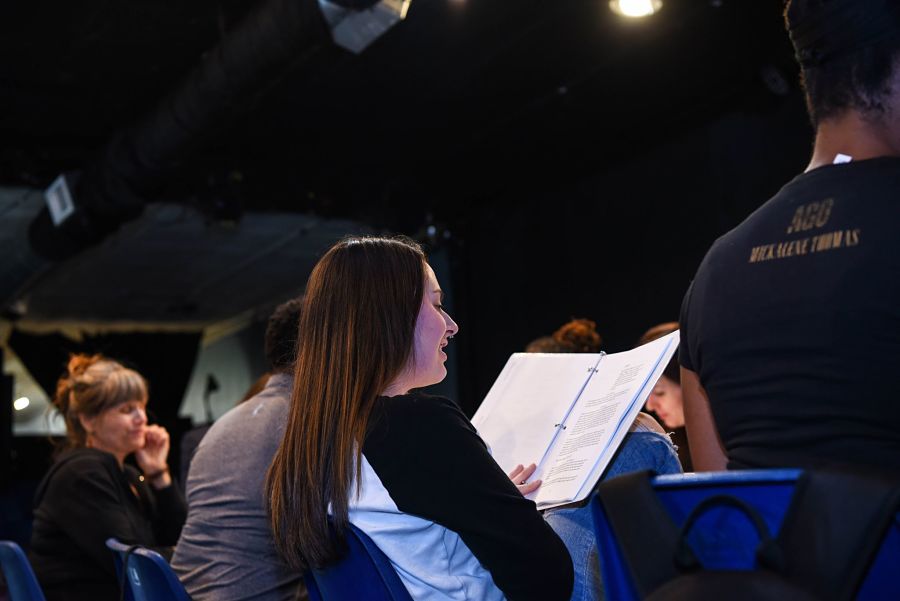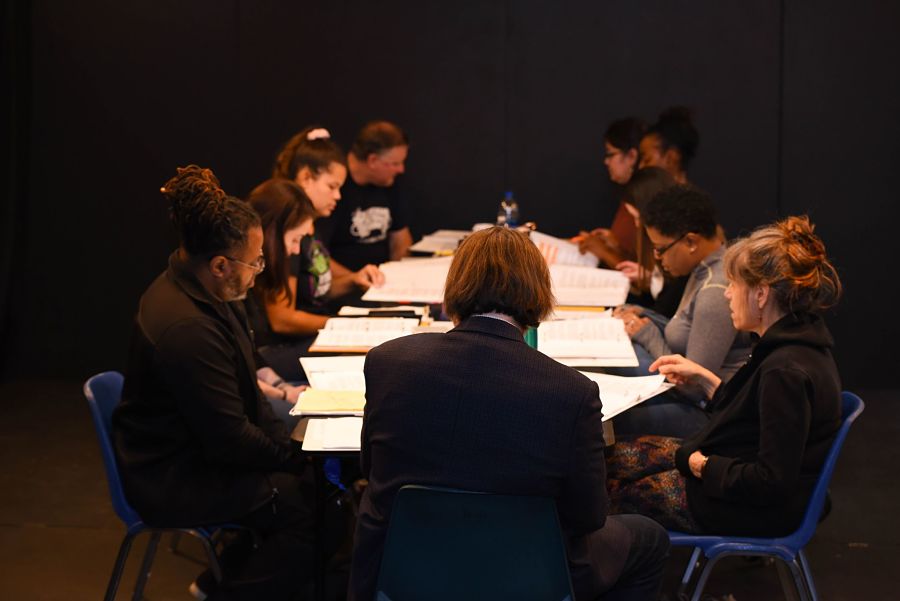At a table reading of Live Bodies for Sale, a new docudrama about human trafficking in Northeast Ohio, playwright Christopher Johnston addresses the assembled cast and crew. “Everybody in this play is real,” he says. “The characters, their monologues, are all taken from what these people have said to me in the time I’ve spent with them. We want to tell their stories.”
There’s clear urgency to their stories. Worldwide, human trafficking currently traps 4.5 million people into lives of exploitation. According to Johnston, sex and labor trafficking represent a criminal industry worth as much as $150 billion each year, making it the second largest black market in the world after the drug trade. Ohio is no stranger to this business. Indeed it is a veritable hotbed of sex trafficking because of its location and its robust transportation infrastructure.
In response to this global tragedy’s local profile, Cleveland’s Playwrights Local will produce the world premiere of Johnston’s Live Bodies for Sale, directed by former Karamu House artistic director Terrence Spivey, Nov. 22-Dec. 15. The documentary play explores the lives of several Cleveland-area women who survived human trafficking. Johnston, author of the book Shattering Silences: Strategies to Prevent Sexual Assault, Heal Survivors, and Bring Assailants to Justice (Skyhorse Publishing, 2018), based his script on years of extensive interviews with people connected to human trafficking. The play includes testimonials from survivors, professionals dedicated to freeing the victims of these crimes, prosecutors, law enforcement, and judges.
Central to both human trafficking interventions in Cleveland, and in the play itself, is the Renee Jones Empowerment Center, a local nonprofit that provides holistic and restorative services to survivors of trafficking and sexual assault. As part of their mission, they provide assistance including counseling, support groups, and street outreach. The center’s eponymous CEO, Renee Jones—also a character in the play—explains that her outreach is “all about love…Our philosophy is taking someone that’s broken, and turning them around. When you become empowered, you begin to take a stand.”
Det. John Morgan, another real-life person who appears as a character in the play, is the head of the Cuyahoga County Regional Human Trafficking Task Force. The task force has undergone specialized training in recognizing human trafficking and in decriminalizing the industry’s victims. In one scene, Morgan directly addresses the audience as he walks them through what goes into busting an operation at a roadside hotel. Assuming the role of an everyday john, Morgan advises, “You don’t want to flash a lot of guns because you don’t want to scare them. But someone is going to have a gun out until they check the room.” Through his years of service, Morgan has helped dozens of survivors out of human trafficking.
In addition to the task force, Cleveland offers aid to victims of human trafficking through the work of the Cleveland Municipal Court’s Human Trafficking Specialized Docket, run by Judge Marilyn Cassidy. This court provides a special docket that treats survivors not as criminals but as victims of crime. It also helps survivors connect to community resources including counseling and Renee Jones’s center. According to Johnston, Cleveland is unique in having so many quality people dedicated to the problem.
While the city may be exceptional in the resources provided to trafficking survivors, the stories that the women in Live Bodies for Sale share are, according to Johnston, broadly representative of the experiences of many women trafficked in the United States. “The stories of these survivors is what I wanted it to be about,” says Johnston. “I wanted that to be the heart of it.”

A common factor in survivors’ stories, as seen in the play, is that many have vulnerabilities which traffickers take advantage of. One character details a “volatile” upbringing with an abusive, alcoholic father. Another describes an abusive husband. Several women describe lives spent in poverty and in thrall to drug and alcohol abuse. According to Johnston, the heroin epidemic ties into many of the cases seen both in this play and in Ohio. One character, “Emily” (none of the survivors’ real names are used in the play) shares how her pimp used heroin to keep her working: “He paid us in heroin. Man, when I got there, I needed a hit every four or five hours. But he just kept giving it to me sooner and sooner. He got me down to where I needed it every two hours—that’s the only reason I stayed.”
The production will include a variety of programmatic tie-ins from many community organizations and will include panels and discussions. Other local organizations that have confirmed participation include the Renee Jones Empowerment Center, Cuyahoga County Regional Human Trafficking Task Force, Saving Grace, Bellefaire JCB, Cleveland Rape Crisis Center, Abolition Bakery, May Dugan Multi Service Center, the LGBT Community Center of Greater Cleveland, and the Zonta Club of Cleveland. Additionally, Live Bodies for Sale has received promotional support from the Hue Jackson Foundation, as well as a Dramatists Guild Foundation 2019 DGF Writers Alliance Grant that awarded Johnston and Playwrights Local $5,000 each.
In addition to his book Shattering Silences, Johnston is a prolific playwright and has published some 3,000 articles in numerous regional and national publications (including American Theatre). In addition to his many years at Karamu House, director Spivey was Cleveland Scene magazine’s “Best Director” for 2017 and was the director of Objectively/Reasonable, a well-received docudrama play about the police shooting of Tamir Rice that premiered at Playwrights Local in 2017.
Playwrights Local, now in its fifth season, is a Cleveland-area professional theatre devoted entirely to locally written works. Artistic director David Todd says he was immediately taken with Johnston’s play. “What drew us to Live Bodies for Sale was the authenticity of Christopher Johnston’s depiction of the subject of human trafficking. The play is based on Chris’s immersive research in the field, and it reflects his experience both as a journalist and as a playwright. I think what Chris does so well is combine that journalist’s eye for the truth with the playwright’s gift for storytelling.”
Johnston thinks the biggest enemy in the battle against human trafficking is silence, coupled with the corollary notion that it “just doesn’t happen here.” His deeply researched play depicting the lives of those who have been trafficked tell us otherwise.


